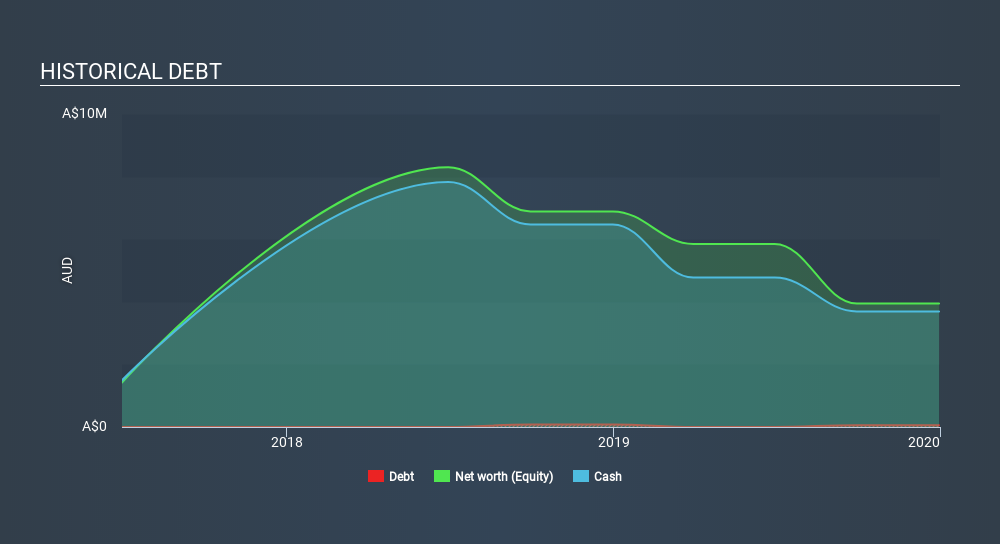- Australia
- /
- Healthcare Services
- /
- ASX:RHY
Did Changing Sentiment Drive Rhythm Biosciences's (ASX:RHY) Share Price Down A Worrying 52%?

The nature of investing is that you win some, and you lose some. Unfortunately, shareholders of Rhythm Biosciences Limited (ASX:RHY) have suffered share price declines over the last year. In that relatively short period, the share price has plunged 52%. Because Rhythm Biosciences hasn't been listed for many years, the market is still learning about how the business performs. The falls have accelerated recently, with the share price down 49% in the last three months. We note that the company has reported results fairly recently; and the market is hardly delighted. You can check out the latest numbers in our company report.
Check out our latest analysis for Rhythm Biosciences
Rhythm Biosciences recorded just AU$688,209 in revenue over the last twelve months, which isn't really enough for us to consider it to have a proven product. This state of affairs suggests that venture capitalists won't provide funds on attractive terms. So it seems that the investors focused more on what could be, than paying attention to the current revenues (or lack thereof). It seems likely some shareholders believe that Rhythm Biosciences will significantly advance the business plan before too long.
Companies that lack both meaningful revenue and profits are usually considered high risk. There is almost always a chance they will need to raise more capital, and their progress - and share price - will dictate how dilutive that is to current holders. While some such companies do very well over the long term, others become hyped up by promoters before eventually falling back down to earth, and going bankrupt (or being recapitalized). It certainly is a dangerous place to invest, as Rhythm Biosciences investors might realise.
Rhythm Biosciences had cash in excess of all liabilities of AU$3.1m when it last reported (December 2019). That's not too bad but management may have to think about raising capital or taking on debt, unless the company is close to breaking even. With the share price down 52% in the last year , it seems likely that the need for cash is weighing on investors' minds. You can click on the image below to see (in greater detail) how Rhythm Biosciences's cash levels have changed over time. The image below shows how Rhythm Biosciences's balance sheet has changed over time; if you want to see the precise values, simply click on the image.

It can be extremely risky to invest in a company that doesn't even have revenue. There's no way to know its value easily. Given that situation, would you be concerned if it turned out insiders were relentlessly selling stock? I'd like that just about as much as I like to drink milk and fruit juice mixed together. You can click here to see if there are insiders selling.
A Different Perspective
Given that the market gained 7.2% in the last year, Rhythm Biosciences shareholders might be miffed that they lost 52%. While the aim is to do better than that, it's worth recalling that even great long-term investments sometimes underperform for a year or more. The share price decline has continued throughout the most recent three months, down 49%, suggesting an absence of enthusiasm from investors. Basically, most investors should be wary of buying into a poor-performing stock, unless the business itself has clearly improved. I find it very interesting to look at share price over the long term as a proxy for business performance. But to truly gain insight, we need to consider other information, too. Take risks, for example - Rhythm Biosciences has 4 warning signs (and 2 which make us uncomfortable) we think you should know about.
We will like Rhythm Biosciences better if we see some big insider buys. While we wait, check out this free list of growing companies with considerable, recent, insider buying.
Please note, the market returns quoted in this article reflect the market weighted average returns of stocks that currently trade on AU exchanges.
If you spot an error that warrants correction, please contact the editor at editorial-team@simplywallst.com. This article by Simply Wall St is general in nature. It does not constitute a recommendation to buy or sell any stock, and does not take account of your objectives, or your financial situation. Simply Wall St has no position in the stocks mentioned.
We aim to bring you long-term focused research analysis driven by fundamental data. Note that our analysis may not factor in the latest price-sensitive company announcements or qualitative material. Thank you for reading.
About ASX:RHY
Rhythm Biosciences
A medical diagnostics company, provides blood tests for the detection of cancers in Australia.
Flawless balance sheet slight.
Market Insights
Community Narratives



